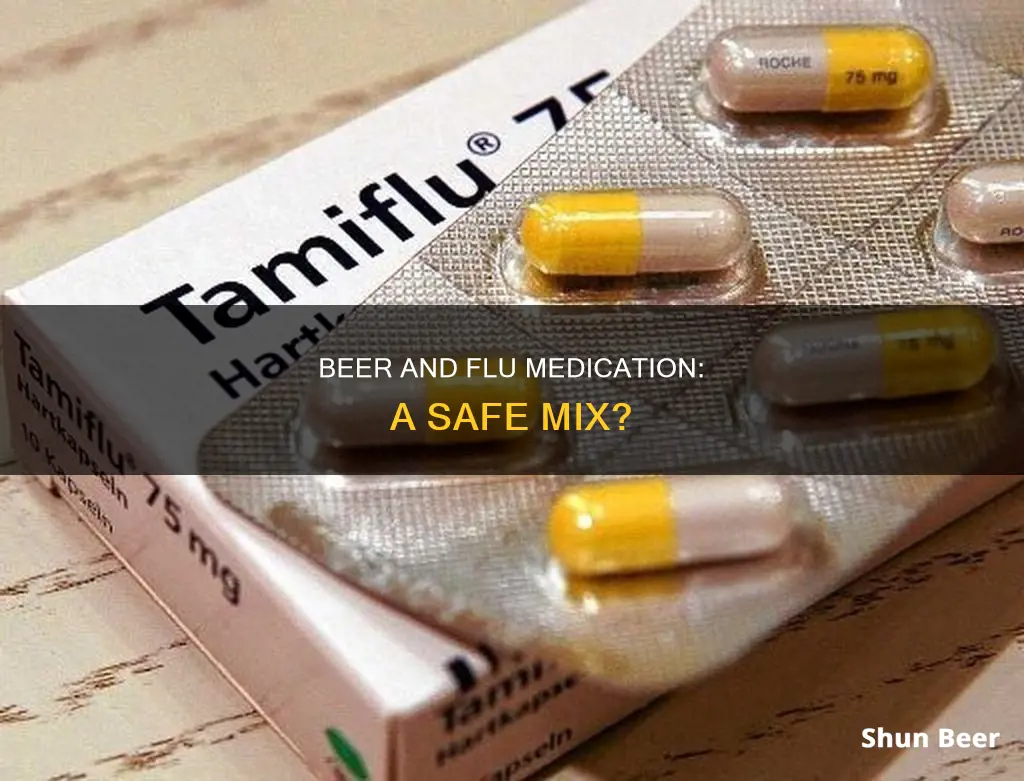
Drinking alcohol while taking flu medication is not recommended, as it can worsen symptoms and side effects such as nausea, vomiting, and headaches. Alcohol can also impair the immune system, making it harder to recover from the flu, and can have dangerous interactions with over-the-counter flu medications. It is especially important to avoid alcohol when taking medications such as cough suppressants and antihistamines, as this can increase the risk of severe side effects, including respiratory depression. While there are no direct interactions between alcohol and flu shots or prescription flu medications like Tamiflu and Xofluza, alcohol can still affect recovery by causing dehydration and prolonging illness.
| Characteristics | Values |
|---|---|
| Direct interaction between flu medication and alcohol | No direct interaction |
| Effect of alcohol on flu symptoms | May worsen flu symptoms |
| Effect of alcohol on medication side effects | May worsen medication side effects |
| Flu medication side effects | Headache, fatigue, upset stomach, dehydration |
| Alcohol side effects | Headache, fatigue, upset stomach, dehydration |
| Effect of alcohol on recovery | May prolong recovery |
| Effect of alcohol on immune system | Impaired immune system |
| Recommended amount of alcohol per day | 2 or fewer drinks for men, 1 or fewer for women |
What You'll Learn
- Flu medication side effects can be worsened by drinking beer
- Beer can cause dehydration, which is dangerous when unwell
- Beer may interact dangerously with flu medication
- Drinking beer while taking flu medication can increase the risk of liver damage
- Beer may impair your immune system, making it harder to recover

Flu medication side effects can be worsened by drinking beer
Drinking alcohol while taking flu medication can lead to dehydration, which can prolong recovery time. Alcohol can also trigger side effects such as headache, fatigue, and stomach upset, which are similar to flu symptoms. As a result, drinking alcohol while sick can make you feel even worse.
In addition, alcohol can impair the immune system, making it harder for your body to recover from the illness. This is especially important to consider when taking flu medication, as your body is already working hard to fight off the virus.
Certain over-the-counter cold and flu medications can also have dangerous interactions with alcohol. For example, combining cough suppressants, antihistamines, or pain relievers with alcohol can increase side effects such as dizziness, drowsiness, impaired coordination, and risk of liver damage. It is advised to avoid alcohol when taking any medication for colds, flu, pain relief, or sleep aids to minimise the risk of adverse effects.
Therefore, it is generally recommended to avoid drinking alcohol while taking flu medication to prevent worsening side effects and prolonging recovery. It is best to wait until you have finished your treatment and are feeling back to normal before consuming alcohol.
Drinking Beer While Driving in Australia: What's the Law?
You may want to see also

Beer can cause dehydration, which is dangerous when unwell
Drinking beer while taking flu medication is generally not recommended, as it can worsen flu symptoms and medication side effects. Beer is a diuretic, which means it increases urine production and can lead to dehydration. Dehydration can be dangerous, especially when the body is already weakened by illness.
When you drink beer, the alcohol is absorbed into your bloodstream through the stomach lining and small intestine. Alcohol is a diuretic, which means it increases urine production by suppressing the release of the antidiuretic hormone vasopressin. This can lead to dehydration, as more fluids are lost than consumed. Dehydration can be further exacerbated if the beer is consumed on an empty stomach, as the alcohol will be absorbed into the bloodstream more quickly.
The effects of dehydration can be particularly harmful when the body is already unwell. Dehydration can worsen flu symptoms such as fever, fatigue, and stomach upset. It can also prolong recovery time, as the body needs adequate fluids to heal and fight off infection. In severe cases, dehydration can lead to a trip to the emergency room.
To maintain proper hydration, it is recommended to drink a glass of water with each beer. This will help replace the fluids lost through increased urination and reduce the risk of dehydration. However, it is important to note that water will not completely counteract the dehydrating effects of beer, and excessive drinking may still lead to dehydration. Therefore, it is best to avoid drinking beer when unwell and instead focus on staying hydrated and giving your body the rest it needs to recover.
Do Sulfite Wands Really Work for Beer?
You may want to see also

Beer may interact dangerously with flu medication
While there are no direct interactions between alcohol and the flu shot or flu medications like Tamiflu (oseltamivir) or Xofluza (baloxavir marboxil), drinking alcohol while taking flu medication is not recommended. This is because alcohol may worsen flu symptoms and medication side effects, such as nausea, vomiting, headaches, and dehydration.
Alcohol and Flu Medication Side Effects
The side effects of alcohol consumption include headache, fatigue, and stomach upset, which are similar to some flu symptoms. Drinking alcohol while sick with the flu may make you feel even worse. Alcohol can also dehydrate you, worsening flu symptoms and prolonging recovery.
Alcohol and Over-the-Counter Flu Medication
Several over-the-counter cold and flu medications can interact dangerously with alcohol. For example, combining antihistamines with alcohol can increase drowsiness and dizziness, putting you at risk for falling and hurting yourself. Other over-the-counter flu medications that can interact with alcohol include acetaminophen (Tylenol), nonsteroidal anti-inflammatory drugs (NSAIDs) such as ibuprofen (Advil, Motrin) or naproxen (Aleve), and cough syrups that contain alcohol, such as NyQuil.
Alcohol and Prescription Flu Medication
Even though there are no direct interactions between alcohol and prescription flu medications, alcohol can still affect you if you have recently received the flu shot or are taking flu medications. The flu shot and flu medications can cause side effects such as soreness, swelling, headache, fatigue, and upset stomach. Drinking alcohol may intensify these side effects, making your recovery more challenging.
Precautions
To avoid complications, it is best to avoid drinking alcohol while taking flu medication or after receiving the flu shot. If you are taking over-the-counter flu medication, speak to a pharmacist about the best medications to use based on your specific symptoms. If you are struggling with alcohol abuse, reach out to your healthcare provider for help.
A Beer Kegerator's Working: Understanding the Basics
You may want to see also

Drinking beer while taking flu medication can increase the risk of liver damage
Drinking alcohol while taking medication for the flu is not recommended. While there are no direct interactions between alcohol and the flu shot or flu medications like Tamiflu or Xofluza, alcohol may worsen flu symptoms and medication side effects. Drinking alcohol while sick with the flu can make you feel even worse, as side effects of alcohol consumption include headache, fatigue, and stomach upset, which are similar to flu symptoms.
In addition, drinking alcohol while taking certain medications can increase the risk of liver damage. Acetaminophen or Tylenol, which is widely available without a prescription and is present in many cold and flu remedies, can cause liver damage if taken in high doses or continuously over several days. The risk of liver damage from acetaminophen is even higher for people who drink alcohol regularly, as alcohol changes the way the liver breaks down this medication. Mixing alcohol with other common medications, such as antibiotics, antihistamines, and cholesterol-lowering drugs, can also lead to liver damage.
Therefore, it is generally recommended to avoid drinking alcohol while taking flu medication to reduce the risk of liver damage and other negative health effects. It is best to wait until you have finished your treatment and are feeling back to normal before consuming alcohol. Consulting with a healthcare provider about any potential interactions between alcohol and your specific medications is always a good idea.
Pumping and Drinking: Is It Safe to Mix?
You may want to see also

Beer may impair your immune system, making it harder to recover
Drinking alcohol while you're sick is generally not recommended, as it can impair your immune system, making it harder to recover. Alcohol can dehydrate you, and dehydration can worsen flu symptoms and prolong recovery. Alcohol can also trigger side effects such as headache, fatigue, and stomach upset, which are similar to flu symptoms. As such, drinking alcohol while sick may make you feel even worse.
In addition, alcohol can have dangerous interactions with certain over-the-counter cold and flu medications, such as cough suppressants and antihistamines. Combining these medications with alcohol can increase side effects such as dizziness, drowsiness, impaired coordination, and difficulty concentrating. It can also increase the risk of respiratory depression, liver damage, and other serious health issues.
Even if you are taking prescription flu medications like Tamiflu or Xofluza, which do not directly interact with alcohol, it is still best to avoid drinking. Alcohol can worsen flu symptoms and medication side effects, as well as prolong recovery.
It is important to note that the effects of mixing alcohol with medication can vary depending on factors such as the type of medication, the type and amount of alcohol consumed, age, and sex. Therefore, it is always advisable to consult with a healthcare provider to understand how alcohol may interact with your specific medications and health conditions.
Beer, Anxiety, and You: A Curious Concoction
You may want to see also
Frequently asked questions
It is not recommended to drink beer or any other alcoholic beverage while taking flu medication. Alcohol can worsen flu symptoms and medication side effects such as nausea, vomiting, and headaches. It can also impair your immune system, making it harder to recover from the illness.
Drinking alcohol while taking flu medication can lead to dehydration, increased dizziness, drowsiness, impaired coordination, and difficulty concentrating. It can also increase the risk of liver damage and other serious health issues.
Yes, certain flu medications, such as cough suppressants and antihistamines, can have severe side effects when combined with alcohol. It is always best to consult a doctor or pharmacist before consuming alcohol with any medication.







